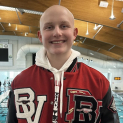Targeting Kinase Inhibitor Induced DNA-Damage Response in Ph-Like ALL

B-cell derived acute lymphoblastic leukemia (ALL) is the most common cancer in children. Despite significant improvements in chemotherapy combinations, approximately 20% of children with high-risk ALL fail their treatments. It is now clear that there are different subtypes of ALL with different genetic mutations. These mutations activate and disrupt signaling pathways within the leukemia cells that allows them to grow out of control. Our laboratory is interested in Philadelphia chromosome-like (Ph-like) ALL, which is associated with a high-risk of relapse and poor overall survival. Our data demonstrates that Ph-like ALL behave very similar to B-cells in the response to signaling inhibition. B-cells are an important component of the immune system and they help to protect us from diseases. They develop from an early primitive B cell to a mature B-cell during multiple developmental steps that are characterize by the presence or absence of the developing B-cell receptor (BCR). The BCR is assembled in a series of steps during which the B-cells stop proliferating to connect the different components of the BCR. During this process B-cells experience high levels of DNA damage which is ultimately repaired. In Ph-like ALL the oncogene activates signaling pathways that prevent the ALL cells to differentiate. Our data demonstrates that inhibition of the oncogenic signaling stops Ph-like ALL cell proliferation and induces high levels of DNA damage like differentiating B cells but does not kill the leukemia cells. Strikingly, combining inhibitors that target the oncogenic signaling and the cell?s DNA-damage repair mechanism kills Ph-like ALL cells.
Project Goal:
The goal of our study is to characterize how Ph-like ALL cells survive the inhibition of oncogene mediated survival signals and we aim to develop new treatment strategies to kill Ph-like ALL cells. Our preliminary data indicates that despite the inhibition of the oncogene activated signaling molecules, Ph-like ALL cells may have multiple mechanisms to rewire their signaling pathways, which results in reduced leukemia cell growth, but not cell death. During our studies we made 2 distinct observations. 1) We identified that the signaling molecule SGK1 was activated in response to the inhibition of the oncogenic signaling pathway and 2) we observed that inhibition of the oncogenic signaling pathway results in the accumulation of DNA-damage which we hypothesize is a conserved mechanism that the Ph-like ALL cells inherited from their original B-cell identity. Based on these findings we aim to determine if targeting SGK1 is a new avenue to sensitize Ph-like ALL cells to oncogene signaling pathway inhibition and finally, we aim to prove that inhibiting the DNA-damage repair machinery in Ph-like ALL cells in combination with inhibitors of the oncogenic signaling pathway is lethal to the cells and presents an alternative treatment option for children with ALL that is less toxic than the currently used chemotherapy regimens. Given that all inhibitors used in the proposed study are either in pre-clinical or clinical testing for the treatment of other diseases, we hope that our findings can be swiftly translated into clinical trials.
2025 Update:
Ph-like acute lymphoblastic leukemia (ALL) is a high-risk subtype of childhood leukemia associated with poor outcomes and resistance to current treatments. Our research focuses on understanding and targeting the unique vulnerabilities of these leukemia cells to develop more effective and less toxic therapies. We discovered that Ph-like ALL cells rely on multiple survival pathways, including JAK2, PI3K, and BCR-like signaling. While blocking all three pathways reduces leukemia in preclinical models, this approach is likely too toxic for children. We identified a key protein, SGK1, that helps leukemia cells survive JAK2 inhibition, and we are investigating new strategies to target it. A promising finding is that Ph-like ALL cells are highly dependent on SMARCA4, a protein that regulates DNA organization. Inhibiting SMARCA4 significantly reduces leukemia cell survival, making it a potential therapeutic target. We are currently testing SMARCA4 inhibitors in animal models and exploring whether combining them with JAK2 inhibitors enhances their effectiveness. Our work highlights SMARCA4 as a novel and potent target for Ph-like ALL, with the potential to improve outcomes for children with this high-risk leukemia subtype.

